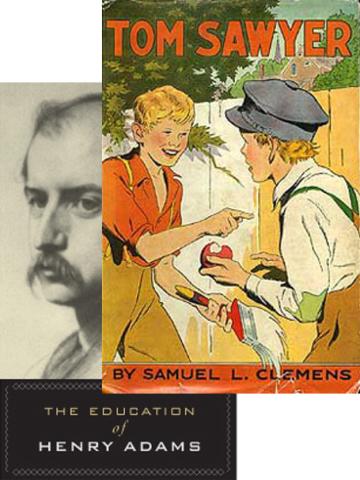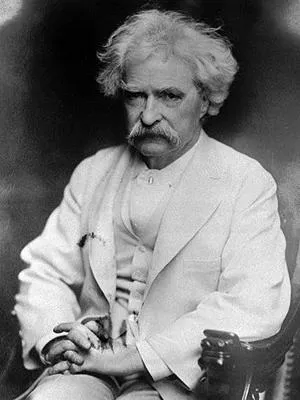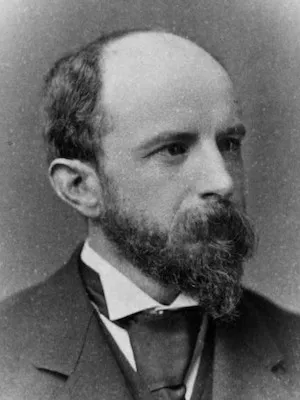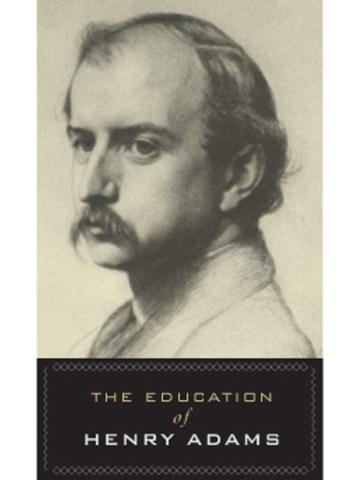
ISBN: 9780689842245 and 9780394600765
The Adventures of Tom Sawyer by Mark Twain is a popular 1876 novel about a young boy growing up in the antebellum South. The story is set in the town of St. Petersburg, inspired by Hannibal, Missouri, where Mark Twain grew up. In The Education of Henry Adams, we learn of the son of a diplomat, the grandson and great-grandson of two American presidents, and a man of extraordinary gifts and learning in his own right. Henry Adams recounts his life from his birth in 1838 and upbringing as a Boston Brahmin, through the Civil War, the nation's industrial expansion, and its emergence as a world power.
Mark Twain's publication in 1876 of his popular novel The Adventures of Tom Sawyer reversed a brief downturn in his success following the publication of his previous novel, The Gilded Age. Twain wrote The Adventures of Tom Sawyer while he and his family were living in Hartford, Connecticut, and while Twain was enjoying his fame. The novel, which tells of the escapades of a young boy and his friends in St. Petersburg, Missouri, a village near the Mississippi River, recalls Twain's own childhood in a small Missouri town. The friendship of Tom Sawyer and Huck Finn is one of the most celebrated in American literature, built on imaginative adventures, shared superstitions, and loyalty that rises above social convention. Twain's American reading audience loved this novel and its young hero, and the novel remains one of the most popular and famous works of American literature. The novel and its characters have achieved folk hero status in the American popular imagination.
The Education of Henry Adams had been an important and influential text for a decade before Henry Adams was awarded the Pulitzer Prize in autobiography in 1918. The import of the text begins with its author, the weight of its influence with its first audience; its continued appreciation has as much to do with the first two factors as the fact that it was brilliantly constructed by a man of letters at the height of his powers. Descended from one of America’s most famous political families, Adams contributed a classic work of American historiography and one of the most famous autobiographies of American literature instead of making a great political contribution to the country. Adams does provide insight into the Adams family, a source of fascination not unlike the Kennedys, but he is curiously silent on two areas of his own life. Adams discusses his experience as private secretary to his father, minister to England during the American Civil War. However, he says almost nothing on his role as advisor and confidante to John Hay, secretary of state to President William McKinley and President Theodore Roosevelt, while the United States became a world power. The other deafening silence concerns the absence of the lessons he must have learned from his wife’s suicide.
Digital object identifier: doi:10.1000/182
OCLC number: 47052486 and 421835

Samuel Langhorne Clemens (November 30, 1835 – April 21, 1910), known by his pen name Mark Twain, was an American writer, humorist, entrepreneur, publisher, and lecturer. His novels include The Adventures of Tom Sawyer (1876) and its sequel, the Adventures of Huckleberry Finn (1885), the latter often called "The Great American Novel".
Twain was raised in Hannibal, Missouri, which later provided the setting for Tom Sawyer and Huckleberry Finn. He served an apprenticeship with a printer and then worked as a typesetter, contributing articles to the newspaper of his older brother Orion Clemens. He later became a riverboat pilot on the Mississippi River before heading west to join Orion in Nevada. He referred humorously to his lack of success at mining, turning to journalism for the Virginia City Territorial Enterprise. His humorous story, "The Celebrated Jumping Frog of Calaveras County", was published in 1865, based on a story that he heard at Angels Hotel in Angels Camp, California, where he had spent some time as a miner. The short story brought international attention and was even translated into French. His wit and satire, in prose and in speech, earned praise from critics and peers, and he was a friend to presidents, artists, industrialists, and European royalty.

Henry Brooks Adams (February 16, 1838 – March 27, 1918; normally called Henry Adams) was an American journalist, historian, academic and novelist. He is best-known for his autobiographical book, The Education of Henry Adams. He was a member of the Adams political family.
In 1868, Henry Adams returned to the United States and settled down in Washington, D.C., where he started working as a journalist. Adams saw himself as a traditionalist longing for the democratic ideal of the 17th and 18th centuries. Accordingly, he was keen on exposing political corruption in his journalism. According to Ken Burns PBS production of the American Civil War, Adams said, "I think that Lee should have been hanged. It was all the worse that he was a good man and a fine character and acted conscientiously. It's always the good men who do the most harm in the world."
In 1870, Adams was appointed Professor of Medieval History at Harvard, a position he held until his early retirement in 1877 at 39. As an academic historian, Adams is considered to have been the first (in 1874–1876) to conduct historical seminar work in the United States. Included among his students were Henry Cabot Lodge, who worked closely with Adams as a graduate student.
On June 27, 1872, he and Clover Hooper were married in Boston, and spent their honeymoon in Europe. Upon their return, he went back to his position at Harvard and their home at 91 Marlborough Street, Boston, became a gathering place for a lively circle of intellectuals. In 1877, he and his wife moved to Washington, D.C., where their home on Lafayette Square, across from the White House, again became a dazzling and witty center of social life. He worked as a journalist and continued working as an historian.




